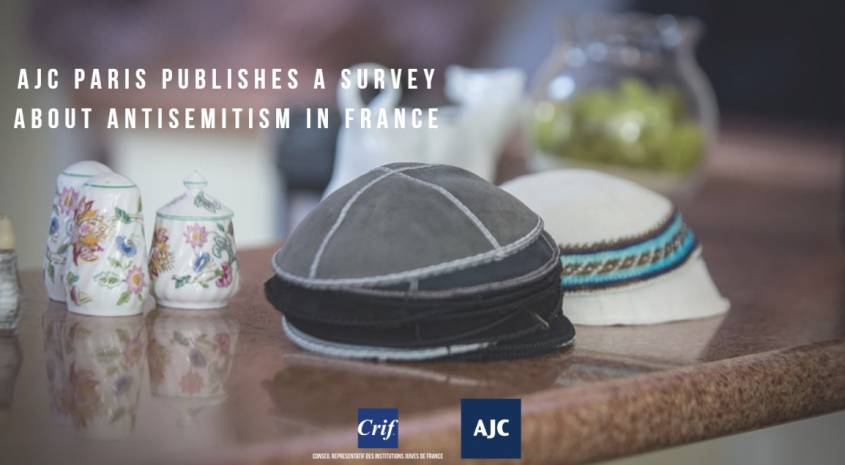 English
English Français
Français
Actualités
|
Publié le 4 Février 2020
Antisemitism - AJC Paris publishes a survey about antisemitism in France

The French office of the American Jewish Committee (AJC) has published its first survey of antisemitism in France; an inquiry into the perceptions of French towards Jewish faith or culture on the issue of antisemitism.
The study was carried out by the IFOP polling institute, in partnership with the Foundation for Political Innovation (Fondapol). A sample of 505 Jewish Frenchmen and 1,027 Frenchmen was interviewed according to a common questionnaire.
We have asked Anne-Sophie Sebban-Bécache, Director of AJC Paris, her views about the survey.
Crif: The survey reveals that the two main places where antisemitic incidents occur are the streets (54%) and the schools (55%). These findings are frightening. Crif President Francis Kalifat has often said that school should be the first step in the fight against antisemitism. What can be the ways to make school a safer place?
Anne-Sophie Sebban-Bécache: First of all, I think that it is absolutely essential to make sure that the school is intractable towards antisemitism. A zero tolerance policy must be applied. When an antisemitic comment is reported, the teacher, or the requested referent, must take it seriously. Convocation of the author, pedagogy, training, and sanctions when necessary, the important thing is to act. A French Jewish child should no longer be afraid at school. Safety must also be done.
Second, in the long term, education is key. Education courses on citizenship and the values of our Republic should prevent the development of antisemitic prejudices among students. Teachers must work with students to concretely deconstruct prejudice.
Finally, the teaching of the Holocaust history deserves to be improved in order to educate vigilant citizens. Emphasis must be placed on the political and ideological processes that led to it, and not just focusing on the emotional aspect (which is necessary but not sufficient because it easily opens the door to victim competition). I want to mention here to the important work of Iannis Roder, history professor in Seine-Saint-Denis (Paris suburb).
Crif: The survey shows that 73% of French people consider that antisemitism is a problem which concerns the whole of French society. Is this perhaps the "good news" of the survey?
Anne-Sophie Sebban-Bécache: Absolutely, this is the encouraging conclusion of this study. For years, our organizations have fought to see this awareness emerge: antisemitism is not only the concern of the Jewish community, it is the concern of all.
It’s a relief to see that the same percentage of French Jews and French people as a whole consider this phenomenon to affect society as a whole.
As we have said for a long time, antisemitism is the precursor of a deeper crisis, it foreshadows the disintegration of the foundations of our democratic societies. Rightly so, we see through our study that antisemitism is a concern for all French people.
This must commit our political leaders to carry out an action commensurate with this concern, that is to say a larger-scale action in terms of resources devoted and territories concerned.
“Antisemitism is not considered anymore as only the concern of Jews. We are not as alone as we could have felt in the past to fight this scourge,” says @AJC_Paris Director @AnneSoSebban about the results of AJC's survey on antisemitism in France. pic.twitter.com/rh2hWvQS1w
— American Jewish Committee (@AJCGlobal) January 20, 2020
